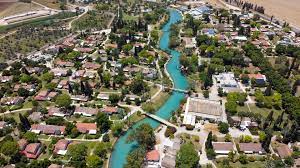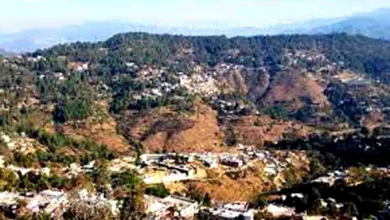Enigma of kibbutz life in Israel

Tuesday, 04 DECEMBER 2023 | in Guest Column
GUEST COLUMN

Embarking on a sojourn within an Israeli kibbutz is to witness a paradigm shift in one’s worldview. Within the realm of modern living, the kibbutz in Israel stands as an unparalleled testament to an extraordinary and incredible cultural existence. At the heart of this nation’s pride, self-reliance and courage lies the kibbutz, serving as the crucible for the astonishing progress of Hebrew culture and the resurgence of Israel itself. To dwell in a kibbutz is to immerse oneself in the very soul of Hebrew culture, an invaluable cultural experience that encapsulates the essence of Israel’s originality.
Since its establishment in 1948, Israel has weathered collective attacks like no other nation in human history. In those formative years, the kibbutz system of a community dwelling emerged as the linchpin that safeguarded Israel’s existence. Constituting a mere five per cent of the population, kibbutz residents, called kibbutzniks, astonishingly produced over 50 per cent of the nation’s food, showcasing the innovative social organisation that became the bedrock of Jewish life. This author has had experience of living in Kibbutz Mizra in northern Israel, a large kibbutz founded by European immigrants in 1923. It is one of 15 kibbutzim (plural of a kibbutz) in the Jezreel Valley Regional Council and a total of 270 in Israel, accommodating some 1,50,000 kibbutzniks.
The Kibbutz, fundamentally an agricultural community, operates on principles of socialism intertwined with religious values. Unlike conventional societies, personal interests find no place in these close-knit communities set against the backdrop of Israel’s idyllic rural landscapes. Uniformity defines a kibbutz life, from community dining halls to undivided family farms. Every aspect of life, from education to medical care, is collectively funded, emphasising a shared responsibility for each other’s well-being. This holistic approach, encompassing farming, external services, hotels and specialty product exports, significantly contributes to Israel’s gross income, rendering these kibbutzim modern-day oases of peace, security, gentleness and creativity.
The first period of the kibbutzim’s history was marred with adversities. Before Israel came into existence, when rich Jews bought land from the Arabs in the beginning of the 20th century, this area amidst the desolate, lifeless hills was badly infested with snakes and scorpions. The medical report found this land to be unfavorable for human settlements. When the elders read this report, they hid it in a safe so that the youth would not be distracted. They told the youth that everything was fine. First, they built sheds for cows, then safe places for children and finally housing for adults.
The first twenty years of the Jews’ experience of kibbutz innovation were like purification, but despite everything they endured, they saved themselves and one day realised that their socio-cultural experiment would be successful. Jewish people continued to purchase land and pursue the kibbutz lifestyle. The history of the kibbutzim is actually older than the nation of Israel. Israel’s neighboring enemies and many other Islamic countries who are today saying that the Jews have infiltrated this land, should know that the Jews had bought this land, on which Israel today prevails as a nation, from the Arabs.
Earlier than Israel as a nation, since 11th Century BCE, this region flourished as the Kingdom of Israel with Saul as its first king, followed by David, and Solomon. The Kingdom of Israel persisted till around 930 BCE when, after Solomon’s death, the kingdom divided into the Kingdom of Israel in the north, and the Kingdom of Judah with Jerusalem as the capital, in the south. The Kingdom of Israel fell prey to Assyrians in 722 BCE and the Kingdom of Judah succumbed to Babylonians in 686 BCE. Thus, we can say, it is the Arabs that are occupying the land that rightfully belongs to Israel.
Beyond their historical significance, kibbutzim have been pioneers in shaping Israel’s identity and development. Many have led agricultural innovations, turning arid landscapes into fertile fields. From the Judean Desert to the Dead Sea, kibbutzim’s efforts have transformed deserts into thriving farmlands, a testament to Israel’s unique blend of technology, art, and courage.
The community lifestyle of kibbutzim fosters a strong sense of social cohesion. A spirit of cooperation and sharing permeates the broader Israeli society, contributing to the country’s defense and socio-economic-cultural development in the face of adversity. The kibbutzim have stood as a strong society in times of conflict.
War is not part of the kibbutz mentality. Yet, whenever war broke out with the Arabs, it was found that 25 percent of the Israeli military’s jet fighter pilots were kibbutzniks. In Israel’s circumstances, having a jet fighter is a big deal. It requires all the skills a human being must possess—courage, intelligence, quick reflexes, tenacity and complete dedication. When such a large number of jet pilots are kibbutzniks, it is an opportunity for the kibbutzim to show that they are not only peace-loving and development-oriented, but also adept in the arts of war.
Israel’s kibbutzim have also emerged as cultural hubs, nurturing artists, writers, and musicians whose works reflect the ethos and values of their unique communities. Their contributions have significantly enriched Israel’s cultural heritage. Furthermore, kibbutzim have set high standards in education and healthcare, influencing broader Israeli systems in these crucial areas. While playing an important role in Israel’s glorious history, kibbutzim have also faced challenges. Despite being a good friend of Israel, America has been against the kibbutz lifestyle based on socialist values. Although the kibbutzim have retained their integrity and identity, their expansion has certainly been overshadowed by American friendship. Socio-economic changes in the era of liberalisation, privatization, and globalization have led to a re-evaluation of traditional social models. Israel’s kibbutzim have incorporated market-oriented reforms, leading to higher individual incomes, private property ownership, and economic diversification.
Amid the Israel-Hamas conflict, Israel’s kibbutzim stand as a powerful symbol of the nation’s deep spirit, social strength and Jewish solidarity. Even though the proportion of kibbutzniks in Israel’s population is low, their influence is still visible to the world in the form of Israel’s empowerment.
(The author is professor emeritus, Department of Environmental Science, GB Pant University of Agriculture and Technology. Views expressed are personal)






